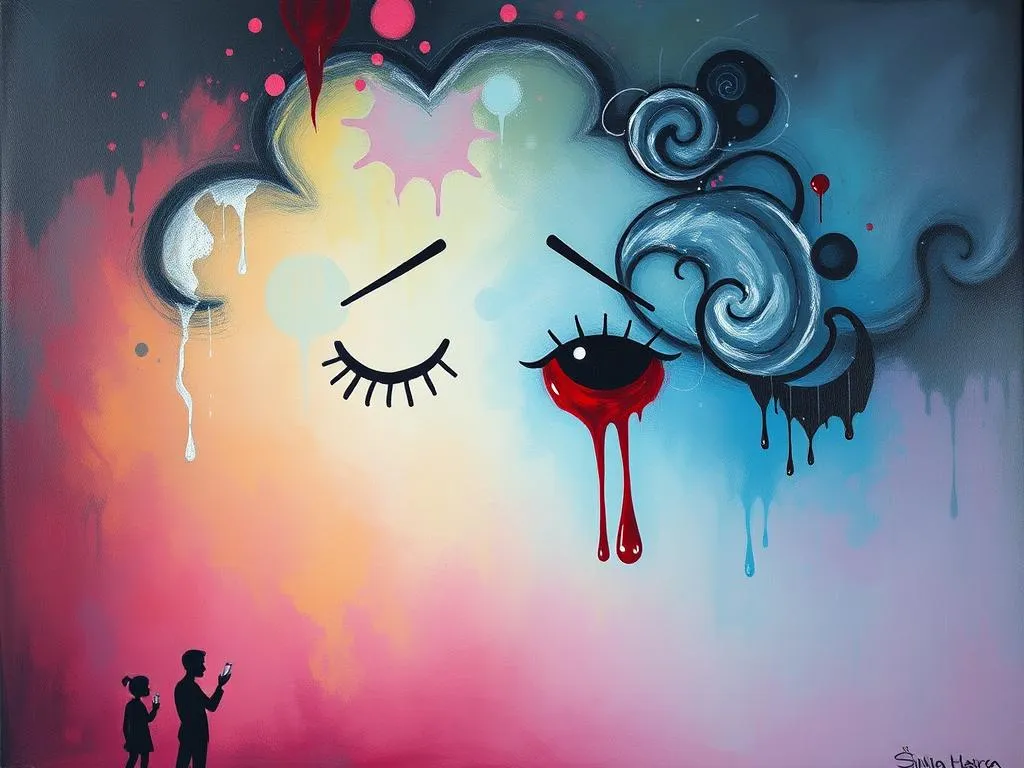
Dreams have always fascinated humanity, serving as gateways to our subconscious and reflecting our innermost emotions, fears, and desires. Among the myriad of symbols that can appear in our nocturnal narratives, tears of blood stand out as particularly intense and evocative. This dream symbol often provokes a visceral reaction, leaving dreamers both intrigued and disturbed. Understanding the significance of such dreams can provide insights into our emotional state, highlighting unresolved issues or deep-seated fears. In this article, we will delve into the symbolism and meaning of tears of blood, explore various scenarios in which they may occur, and connect these dreams to real-life experiences for deeper self-reflection.
Symbolism and Meaning
The imagery of tears generally represents feelings of sorrow, grief, or overwhelming emotion. They can symbolize a release of pent-up feelings, a cry for help, or a deep-seated pain that needs acknowledgment. When these tears are depicted as blood, the symbolism intensifies. Blood often relates to life force, vitality, and the essence of our being. In many cultures, it signifies sacrifice, deep emotional turmoil, or a connection to one’s heritage and identity.
When combined, tears of blood can symbolize a profound emotional crisis. They may represent the pain of loss, whether it be the end of a relationship, the death of a loved one, or a significant life change. This dream can also signify feelings of betrayal or deep hurt, suggesting that the dreamer feels wounded on a deeper, emotional level. The blood aspect implies that this pain is not superficial; it runs deep and is intrinsic to the dreamer’s experience.
From a psychological perspective, tears of blood may indicate a struggle with feelings of guilt or shame. The act of crying is often viewed as a release, but when tears are tinged with blood, it suggests that the emotions being released are tied to something much darker and more complex. This could point to feelings of inadequacy or unresolved trauma that desperately need addressing.
Moreover, the dream may serve as a wake-up call, a signal from the subconscious urging the dreamer to confront their pain and heal. It can highlight the importance of recognizing one’s emotional wounds rather than allowing them to fester beneath the surface. In essence, tears of blood can be a profound reminder that true healing requires acknowledging and processing our grief.
Key Scenarios and Variations
The context and scenarios surrounding the dream can greatly influence its interpretation. For instance, dreaming of shedding tears of blood while experiencing a physical injury can suggest that the dreamer feels hurt either physically or emotionally. This scenario indicates that the pain is not only present but also deeply felt, emphasizing the need for healing in both realms.
Conversely, if the dream involves witnessing someone else crying tears of blood, it may reflect the dreamer’s feelings of helplessness or empathy towards that person. This scenario might indicate that the dreamer is processing their own emotions by channeling them through another’s pain, suggesting a strong emotional connection or concern for others’ well-being.
Another variation may involve the dreamer crying tears of blood in a public setting, such as a crowded room. In this case, the dream could reveal feelings of vulnerability or exposure, suggesting that the dreamer fears their emotional struggles are visible to the world. This may reflect anxieties about judgment or rejection from others, highlighting a need for support and understanding.
On the other hand, if a dreamer finds themselves crying tears of blood after a significant life event—such as a breakup, job loss, or relocation—it could signify the emotional weight of that transition. This dream might indicate that the dreamer is grappling with feelings of loss and is in need of time to process these changes fully.
Moreover, in a more transformative context, tears of blood can signify a metamorphosis. If the dreamer experiences catharsis or healing following the tearful experience, it may suggest that they are on a path toward emotional resolution. This variation implies that while the pain is profound, it can lead to growth and new beginnings.
Real-Life Connections and Takeaways
Connecting dreams of tears of blood to real-life situations can provide invaluable insights into one’s emotional landscape. If you have experienced this dream, it may be beneficial to reflect on any recent events that have elicited strong emotions. Are there unresolved feelings that you have been avoiding? Are there relationships or situations in your life that are causing you distress?
Practical advice for self-reflection includes journaling about your feelings upon waking from the dream. Writing down your thoughts can help clarify the emotions tied to the dream, offering a pathway to understanding the underlying issues. Consider exploring themes of loss, betrayal, or trauma in your life and how they may relate to your dream.
Additionally, seeking the support of a therapist or counselor can be a proactive step. Talking through your feelings with a professional can provide guidance in navigating emotional complexities. It can also help foster a sense of safety in exploring painful topics, ultimately leading to healing.
Engaging in creative outlets, such as art, music, or dance, can also be a powerful way to process emotions related to the dream. These forms of expression can facilitate the release of pent-up feelings and allow for exploration of difficult themes in a safe environment.
Finally, consider the importance of self-compassion. Recognize that experiencing such intense emotions is a natural part of being human. Allow yourself the space to grieve, to feel, and to heal. Your tears, even those that may seem bloodied, signify a journey toward emotional clarity and growth.
In conclusion, dreams of tears of blood serve as a haunting yet powerful symbol of our emotional struggles. By exploring the meaning behind these dreams, reflecting on their scenarios, and connecting them to real-life experiences, we can gain invaluable insights into our emotional well-being. Embrace the opportunity for growth and healing that these dreams present, and remember that every tear shed is a step toward understanding and reclaiming your emotional self.







